You are here
Events
On the ‘ISMS’ of India: Policy Dialogue with Students from IIT Madras
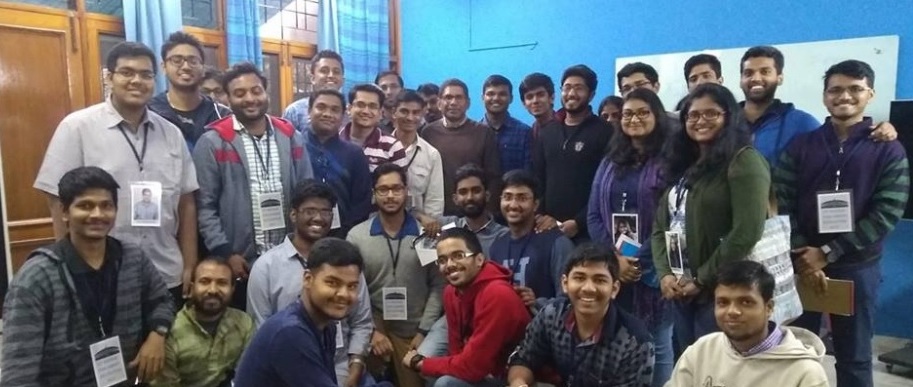
On 10 December, we hosted the Student Legislative Council from IIT Madras for a policy dialogue on the ideological traditions that predominate the political and policy landscape in India. Steered by Parth Shah, President, CCS, the dialogue further addressed the continuing challenges of effective policy-making, and the role of the individual, market and the state in enabling a freer and prosperous India.
Our ‘CCS on Campus’ initiative reaches out to leading colleges across the country to engage young learners in a critical dialogue on pressing socio-economic and political concerns. Through 2-3 hour ‘Campus Talks’ and ‘Policy Dialogues’, we encourage students to contest and debate learned presumptions and to explore the foundations of a free, prosperous and just society.
If you’d like to have CCS on your campus, or collaborate with us for a policy dialogue, write to us to us at shefali@ccs.in.
2nd Law and Liberty Conference
Theme: Perspectives on Liberty in a Digitised India
Law and Liberty Conference (LLC) is our flagship annual academic congregation exploring the interstices of legal thought and practice, and their relation to the idea of liberty. A key component of modern social and political orders, liberty is seen as one of the founding principles of rule of law. The spheres of liberty are manifold, with implications for economic, civic, and personal practices of individuals and communities. LLC provides an opportunity for rigorous academic analyses and dialogue on issues most pertinent to the exercise of liberty, and the role of law in securing and impeding the same. The Law and Liberty Conference is a unique opportunity for academicians, scholars, practitioners, and students to interrogate the constraints and challenges to the principle and practice of liberty, and understand how these may be mitigated.
Law and Liberty Conference 2017 is being organized by Centre for Civil Society in collaboration with Law and Technology Society, National Law School of India University, Bangalore
Objectives
- To highlight emerging concerns in the domain of individual liberty and the legal and regulatory frameworks which enable the flourishing of a liberal society
- To explore the opportunities and challenges to the preservation and extension of liberty across digital objects and sites
The 2017 edition of the conference will have 3 thematic sessions:
- Digitising Governance and Public Service Delivery: Digital modes of governance are under adaption at an unprecedented scale. The e-Kranti initiative of National e-Governance Plan (NeGP) has outlaid the digitization of over 44 public service delivery verticals at Centre and State level and development of Common Service Centres across the country. Such e-governance initiatives have developed a range of digital interfaces, from websites to mobile applications and bio-metric enabled Smart Cards. Experiments independently and in collaboration with corporate and NGOs, such as ITC’s e-Choupal, Gyandoot in Madhya Pradesh, Aksh Broadband in Rajasthan, IRCTC, and Passport Seva, have successfully developed and tested intranet portals for a range of functions, from produce procurement to facilitating Government to Citizen (G2C) digitised service delivery.
- Regulatory Frameworks for Aggregator and Sharing Economy: The need for revisiting principles framing regulations is accentuated by the emergence of aggregators and sharing economy in India, and its exponential growth in on-demand transport, crowd-funding, and hospitality sectors. The sharing economy radically transforms the conventional definitional tenets of labour, establishments, services, and the consumer-provider relationship by developing peer-to-peer sharing, dynamic pricing, and service ownership. With the growing relevance of sharing economy in fostering skill development and micro-entrepreneurship, an agile, enabling framework that balances consumer protection with ease of doing business is requisite.
- Regulating Data Services and Digital Payments: Support functions of expanding digital literacy and inclusion are also mapped through projects such as the National Optic Fibre Network (NOFN), and ongoing TRAI consultation on provision of Free Data in rural India without violating the bright-line principles set against zero-rating. Additionally, the impetus for a cashless economy is mandated through a separation of payments and banking, and the regulatory frameworks governing the two. This entails a complete digitization of payments and receipts within government, with an eye to increase the reach and incentivizes the usage of digital payments. From autonomy in regulation to legislative revision of Payments and Settlement Systems Act (2007) mandating open access, interoperability, competition and innovation—the role of private entities in facilitating the development and delivery of digital services in governance and exchange is growing exponentially and demanding systemic redesigning of regulatory frameworks and rethinking of the role of the state
Registration deadline: 20th November 2017
Registration Fee: Students: INR 500/-; Others: INR 1000/-
For details contact:
Jatin Garg (jatin@ccs.in) or Arushi Vats (arushi@ccs.in)
+91-9915608674 | +91-11-2653 7456; ext.-25
9th School Choice National Conference
THEME- Direct Benefit Transfers in Education: Policy, Politics, Parents
Registration deadline: 04th November 2017
Objectives
- To discuss and debate various dimensions of DBT including ideation, the theory of change, identification of areas of application, implementation and various challenges at each step.
- To explore DBT as a tool to bring greater transparency, accountability, and efficiency in the education system through empowering parents and enabling choice of access in education.
The 2017 edition of conference will have 3 thematic sessions:
- DBT experiments & models- National and global: The session addresses the current status of Direct Benefit Transfers- across sectors and geographical boundaries. This involves examining the various DBT- centric experiments and models that have been carried out around the world on a microscopic level and framing them in an Indian context. This discussion on respective experiences would help enable the audience to understand the relevance of an alternative such as DBT.
- DBT in Education- Impact, Incentives, Issues: The session would be exploring the issue of learning outcomes that currently plagues the education sector and the potential role that DBT can play in overcoming the same. Panelists will also be elaborating upon the supply and demand of such an alternative, as well as parents’ capacity and readiness for DBT in education. The latter half of the session would be dedicated to understanding the economic and political implications of introducing DBT, since such a scheme would essentially convert the role of the State from being the provider of education into that of being the primary financier of education.
- DBT in Education- Implementation designs and readiness: Building upon the first two sessions, the third panel would delve into the possible scheme designs that DBT in education could manifest into. The panelists will look into the infrastructural and technological requirements of the scheme, and explore the various mechanisms using which DBT can be successfully implemented.
Registration Open: Apply Now
Registration Fee
- NGO Leaders / Research Scholars / School Principals: INR 1000/-
- Students: INR 750/-
- Others: INR 1500/-
For details contact Nitesh (scnc@ccs.in | +91-88003 44700 | +91-11-2653 7456; ext.-16)
Business and Public Policy Credit Course at Vedica Scholars Programme for Women, New Delhi
Business and Public Policy is a niche module providing a detailed examination of the role and impact of public policy on Indian businesses. It takes the perspective of a firm’s manager and asks the twin questions: (a) to what extent does government intervention limit a firm’s strategy; and (b) how can firm strategy influence and take advantage of government intervention by comparing the performance of firms, alliances, and markets in coordination with economic activity. Offers exploration of key laws such as New Companies Act, the role of regulatory bodies, as well as conceptual tools such as 'Markets for the Poor'. This is a closed event for students at Vedica Scholars Programme for Women. For more information on the Business and Public Policy module and how it could be offered at your institution, please contact arushi@ccs.in.
Objective: To make students understand the interconnection between business and public policy through the application of economics, management, and public policy.
Launch of Delhi Citizens' Handbook 2017: Government to Citizen Services
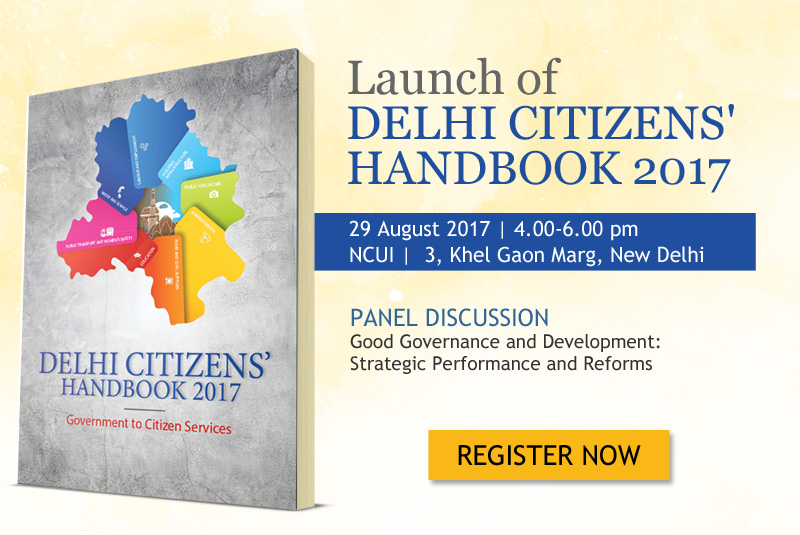 Centre for Civil Society and FNF South Asia are pleased to invite you to:
Centre for Civil Society and FNF South Asia are pleased to invite you to:
The launch of the Delhi Citizens' Handbook 2017 and a panel discussion on “Good Governance and Development: Strategic Performance and Reforms”.
29 August, 2017
NCUI, New Delhi | 4:00-6:00 PM
The Delhi Citizens' Handbook features research papers assessing the impact and relevance of policies that shape the lives of ordinary citizens in the national capital on eight core areas of urban governance: Administration, Education, Public Healthcare, Water and Sewage, Labour and Employment, Food and Civil Supplies, Public Transport and Women's Safety, and Housing Infrastructure. The Handbook has been prepared with the aim of functioning as a critical resource for productive public intervention and for ensuring an informed discussion on achieving effective and accountable governance.
The panel discussion will be centered on exploring the idea of governance and development, taking from the policy shortcomings addressed in every chapter of the Handbook. It will also address the critical questions of how governance and developmental reforms, for instance the recent e-governance initiative, can take place in a country like ours, and what the expected role of governmental and non-governmental institutions will be in this process.
Agenda
| 4:00-4:30pm | - | High tea and Research paper presentation |
| 4:30-4:50pm | - | Introduction by Centre for Civil Society Welcome remarks by Friedrich Naumann Foundation |
| 4:50-5:00pm | - | Launch of the Handbook and keynote address by Deputy CM Manish Sisodia |
| 5:00-5:45pm | - | Panel discussion: Good Governance and Development Panellist: Atishi Marlena, AAP Anjali Srivastava, Praja Vikramjit Banerjee, Advocate, Supreme Court |
| 5:45-5:50pm | - | Closing Remarks and Vote of Thanks |
The Delhi Citizen's Handbook 2017 focuses on:
- Administration: The implementation and outreach of the e-District Delhi Project under the National e-Governance Plan.
- Education: The accessibility, inclusivity and efficiencyof provisions under Section 12(1)(c) of the Right to Education Act.
- Public Healthcare: The quality and accessibility of public healthcare facilities like government hospitals and mohalla clinics.
- Water and Sewage: The effectiveness of pollution control and wastewater management systems.
- Labour and Employment: The implementation and effectiveness of the Minimum Wages Act.
- Food and Civil Supplies: The effectiveness of the Public Distribution System and efficacy of Fair Price Shops.
- Public Transport and Women's Safety: The challenges faced by women service providers in the transport industry.
- Housing Infrastructure: The extent to which affordable housing is made available to the urban poor in Delhi by the government.
Speakers and Panelists |
||
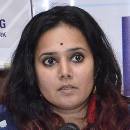 |
 |
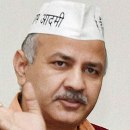 |
| Anjali Srivastava Asst. Manager, Praja Foundation |
Atishi Marleena Advisor to the Deputy Chief Minister of Delhi |
Manish Sisodia |
 |
 |
 |
| Parth J Shah President, Centre for Civil Society |
Ronald Meinardus Regional Director, Head of Regional Office South Asia, Friedrich Naumann Foundation |
Vikramjit Banerjee Advocate, Supreme Court of India and legal affairs with BJP |
| Glimpses of Delhi Citizen's Handbook 2016 Launch |
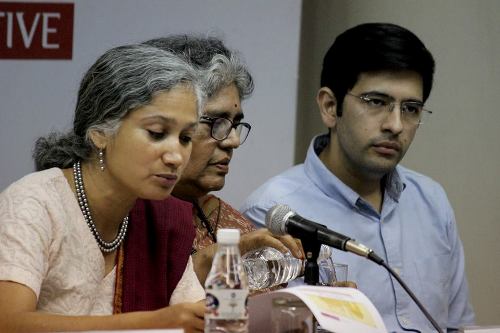 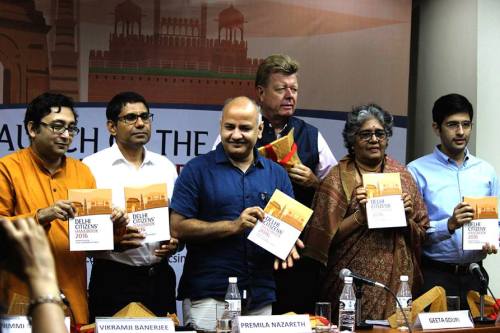 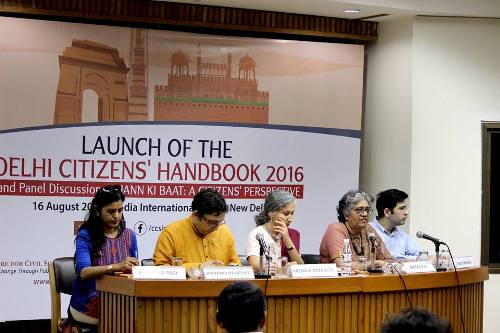 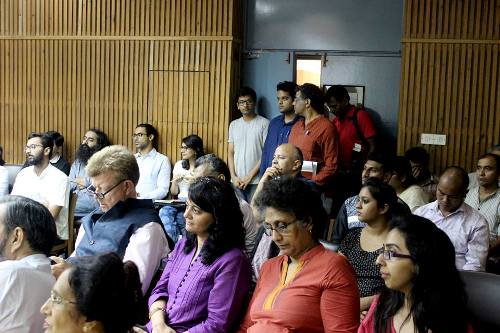 |
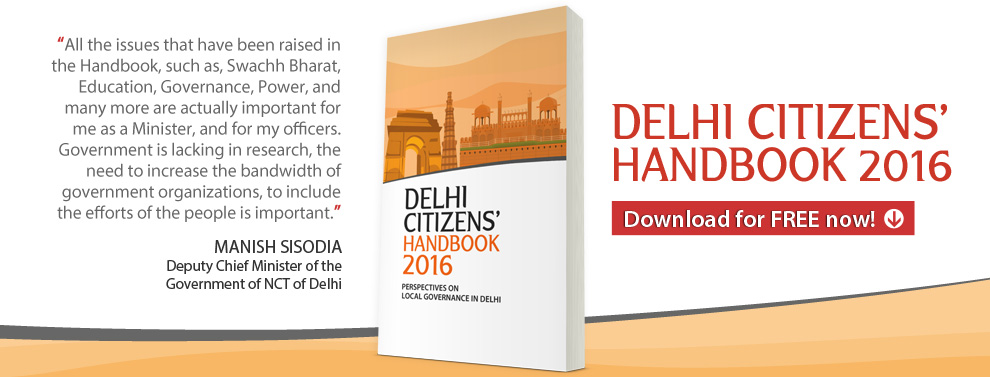
Looking forward to your participation!
For more information, contact: Sadaf Hussain| sadaf@ccs.in | +91 99531 33868
 |
 |

